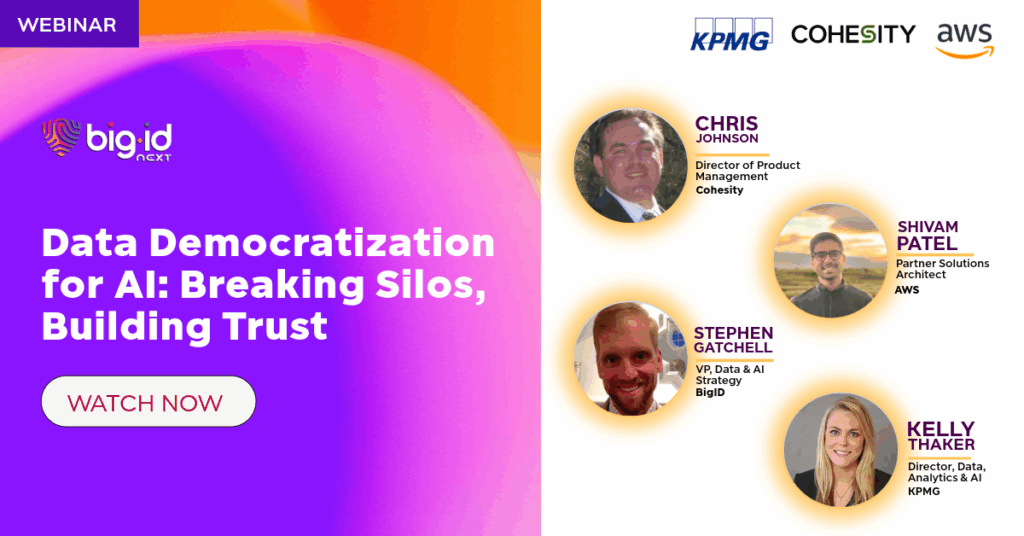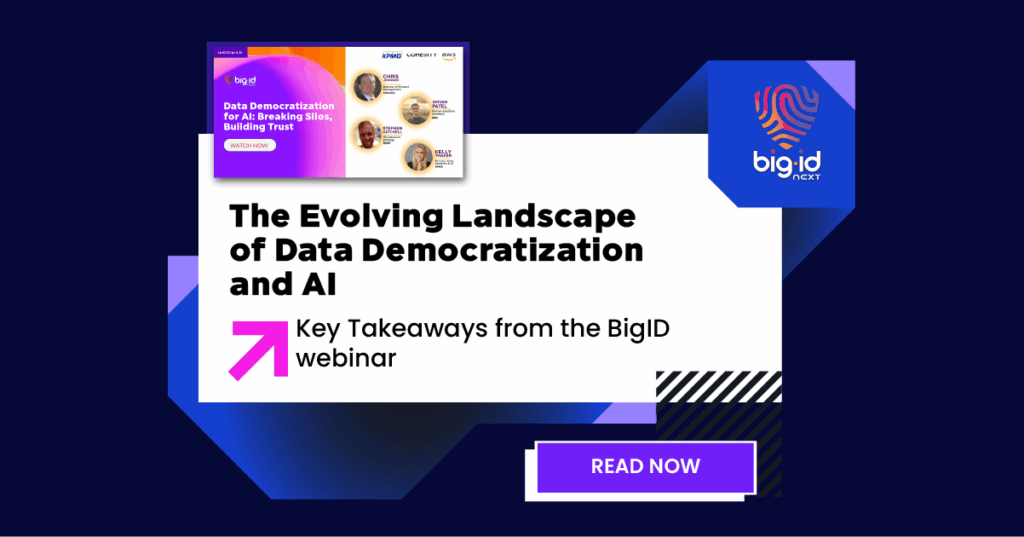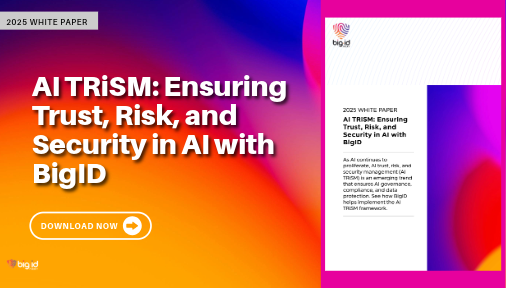In BigID’s latest expert panel, “The Evolving Landscape of Data Democratization and AI,” thought leaders from BigID, AWS, Cohesity, and KPMG came together to explore the critical intersection of AI readiness and secure data access. The session offered actionable insights for data leaders navigating today’s fast-changing digital terrain, especially as organizations move beyond traditional silos toward enterprise-wide data empowerment.
As AI adoption accelerates, the importance of making high-quality, trustworthy data available to a broader range of users has never been clearer. But with that accessibility comes a responsibility: to ensure data is governed, traceable, and safe to use. And for many organizations, the path to democratization is as much about mindset as it is about metadata.

Key Takeaways
One of the most compelling takeaways from the session was the idea that AI success hinges on trust—trust in your data’s quality, its lineage, and its compliance posture. As Steven Gatchel, VP of Data and AI Strategy at BigID, put it:
Across the clients that we work with, there’s a big focus for wanting to do, like, these AI readiness assessments on data… Being able to access it and ensure its quality is essential for AI.
That readiness doesn’t just apply to structured databases. It now includes unstructured sources like PDFs, call transcripts, emails, and system logs. Making sense of that sprawl—and preparing it for use in AI—is where metadata takes center stage.
The Missing Link Between Governance and AI
Metadata emerged as a central theme throughout the discussion. Panelists emphasized its growing role in ensuring data traceability, managing risk, and supporting ethical AI. Chris Johnson, Director of Product Management at Cohesity, captured this perfectly:
Metadata is just as important as the data itself. It enables observability and provides context like how data was generated… Without it, organizations risk regulatory issues.
The conversation also tackled the balance between innovation and governance—specifically how companies can encourage safe experimentation without introducing unnecessary risk. Shivam Patel from AWS noted that experimentation is inevitable, and should be embraced—with the right controls in place:
Employees want to experiment. Democratization in a secure way enables teams to discover insights, rapidly develop solutions, and avoid anti-patterns.
What’s Holding Teams Back? Webinar Poll Results Reveal Key Challenges
During the live session, attendees were asked to weigh in on their top barriers to data democratization. The results painted a clear picture of today’s most pressing roadblocks:
- 52% cited fragmented data across silos as their biggest challenge
- 31% pointed to a lack of metadata and observability tools
- 17% said leadership buy-in was the primary obstacle
These insights aligned closely with the panel’s discussion—reinforcing the need for unified data governance frameworks, stronger metadata strategies, and executive alignment to scale AI responsibly.
What made this session especially relevant was the shared belief that democratization isn’t about opening the floodgates—it’s about empowering users with the right level of access, the right context, and the right tools. Generative AI is helping bridge the technical gap, enabling non-technical users to interact with data in new, more intuitive ways—but that only works if the underlying data is reliable and responsibly governed.
Panelists also discussed practical steps: from building stronger data literacy programs across business units to implementing centralized governance frameworks that support collaboration without compromising compliance. It’s not about choosing between control and innovation—it’s about creating the conditions where both can thrive.
As Kelly Sacker from KPMG summed up:
Data democratization’s importance has skyrocketed as AI becomes embedded into business strategies. Empowering non-technical personas is key for making AI a success.
If your organization is working to unlock AI while keeping data safe, this session is a must-watch.
Missed the live discussion? Watch the full webinar on demand here or subscribe to our newsletter to stay in the loop for future events.



